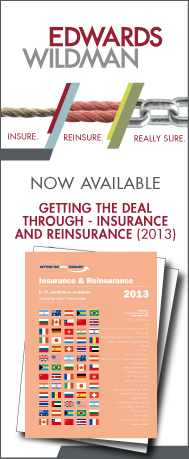 |
|
| edwardswildman.com | |
Welcome to the second e-edition of the Edwards Wildman Insurance and Reinsurance Review. On the U.S. side, we report on reinsurers' need to comply with Iran sanctions; the potential impact of a landmark New York Court of Appeals decision on insurance coverage disputes; how the Deemer Clause may affect Insured ERISA plans; and how the "duty to advise" can be a liablity to Connecticut insurance producers. On the UK side, we consider the treatment of serial claims or losses; the status of Solvency II; an English Court decision regarding the Bermuda Form; and the applicability of a claims control clause. The opening paragraphs of all articles are presented below, from which you can choose the full articles. All articles are also available from their listing in the left-hand column. We hope you enjoy this edition of the Edwards Wildman Insurance and Reinsurance Review. Paul Kanefsky Victoria Anderson
ARTICLES IN THE AUGUST 2013 EDITION OF THE REVIEW
Reinsurers Pressed for Compliance with Iran Sanctions The U.S. government administers and enforces economic sanctions programs primarily against countries and groups of individuals such as terrorists, through either comprehensive or selective action, using the blocking of assets and trade restrictions to accomplish its foreign policy and national security goals. Due to Iran’s support for international terrorism and its aggressive action against international shipping in the Persian Gulf, the U.S. has imposed a trade embargo on Iran for more than 30 years. In general, unless licensed by the U.S. Treasury, Office of Foreign Assets Control (OFAC), no U.S. person, wherever located, may sell, supply, export or have re-exported on their behalf, any goods, technology or services to Iran or to the Government of Iran. More >> The New York Court of Appeals' Landmark Decision in Diocese of Brooklyn and Its Potential Impact on Insurance Coverage Disputes In a landmark decision, New York State’s highest court, the Court of Appeals, recently addressed for the first time a host of issues that are familiar to insurance coverage disputes – allocation, number of occurrences/retentions, and waiver – in the context of underlying claims of sexual abuse. More >> How a State's Anti-Discretion Regulation Might Not Apply to Insured ERISA Plans: the Deemer Clause An insurer can administer claims for benefits made against an employee-benefit plan that is funded by an insurance policy issued by that insurer. The plan may give the insurer the discretion to interpret its own policy’s terms to determine whether the plan covers a claim for benefits. When an insurer enjoys this delegation of authority, a court can overrule the insurer’s denial of a claim only if the court finds that the administrator abused its discretion. More >> Connecticut Insurance Producers Take Note: Long-Term Care Insurance and the Duty to Advise Insurance producers selling life and health insurance in Connecticut are increasingly involved in advising on their clients’ long-term care needs, i.e., the services associated with the activities of daily living once people are no longer able to care for themselves. Increased opportunities to provide advice, however, come with greater risk. More >>
World Trade Center Events: One or Two? In many areas of business insurance and reinsurance, whether a series of claims or losses is treated as one claim or several claims for the purposes of the insurance or reinsurance contract is an important question. It has repercussions on how many deductibles or excesses apply, the applicable limits of cover, and the effect of giving notice of claims. More >> Solvency II: Why the UK's Prudential Regulation Authority Must Show More Humility By 19 April 2013, Andrew Tyrie, Chair of the UK’s Parliamentary Commission on Banking Standards and the UK Treasury Committee, had sent two letters to Andrew Bailey, a deputy governor of the Bank of England and CEO of the Prudential Regulatory Authority (PRA), and Bailey had sent two back. More >>
In a first for the English courts, the Commercial Court has decided a case concerning the construction of the Bermuda Form under English law: AstraZeneca Insurance Company Ltd v XL Insurance (Bermuda) Ltd [2013] EWHC 349 (Comm). Usually excess liability insurance underwritten on the Bermuda Form is expressly governed by a modified form of New York law and disputes are determined by arbitration in London. More >>
The High Court rules on the effect of a claims control clause where cedants and some reinsurers unilaterally paid out their share of a claim. More >>
Edwards Wildman Industry Presence IFNY Interns Program Update More>> The Road to Rendez-vous More >> Accolades More >> Speaking Engagements More >> Upcoming Presentations More >> Articles More >>
| |
 |
|
